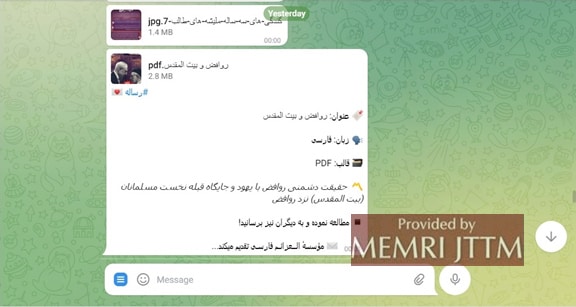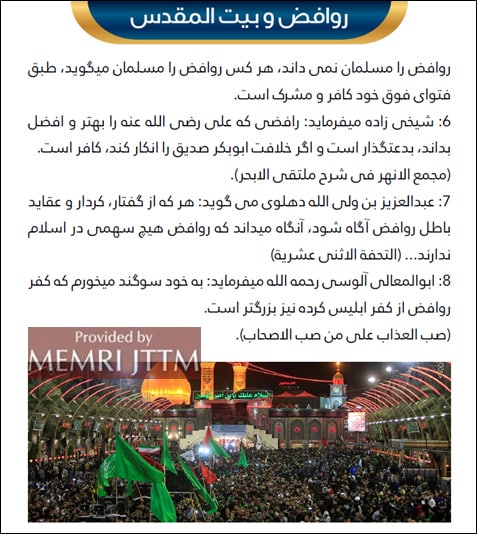The following report is now a complimentary offering from MEMRI's Jihad and Terrorism Threat Monitor (JTTM). For JTTM subscription information, click here.
In a Dari-language book, the Islamic State Khurasan Province (ISKP) accuses Iran of oppressing Sunni Muslims and argues that Iran and the Shi'ites across the world value Karbala in Iraq more than they value Jerusalem.[1]
The Al-Azaim Media Foundation, a media outlet linked to the Islamic State Khorasan Province (ISKP), which defines itself as a supporting entity for the Islamic State (ISIS), published the 60-page book, titled "The Rawafidh [rejectionist, a pejorative term for Shi'ite] and Bait Al-Maqdis [i.e., Jerusalem]," which discusses Iran's claims about Palestine and Al-Aqsa (Jerusalem). The book argues that Iran and Israel pretend to be enemies while working together, and Iran and other countries like Jordan and Turkey are only nominally Muslim.

The cover of the book
The book begins by briefly discussing the virtues and importance of Bait Al-Maqdis in the light of the Quran and hadiths (traditions of Muhammad). It then reviews the history of the conquest of Jerusalem by the second Islamic caliph Umar ibn Khattab, its capture by the Crusaders, its recapture by Saladdin, and says that now the "First Qibla[2] [i.e., Jerusalem]" is under Jewish occupation.
The unidentified author refers to the ongoing oppression of Muslims in Palestine and Jerusalem and says that, in 2014 in the form of Abu Bakr Al-Baghdadi, a leader of Muslims appeared who heard the cry of the oppressed Muslims and raised his voice for the liberation of Jerusalem. However, today the apostates who call themselves the leaders of Islamic countries protect Israel and do not allow the mujahideen to attack the Jews for the liberation of Al-Quds (i.e., Jerusalem), the author says, adding that this is why the Islamic State prioritizes the elimination of apostates.
The book presents the governments of Jordan and Turkey as examples of apostate governments and adds that Iran has been professing its enmity with Israel for years but has not fought it. Iran's latest attack on Israel was also planned in advance and Iran informed Israel that its goal was not to harm its Jewish brothers, the author further says.
According to the author, Iran's attack on Israel was revenge for the killing in Syria of its own citizens, not for the massacre of Muslims, because the strike happened after its own citizens were killed. The book argues that Jerusalem is not important to Iran and its support for Hamas is also for its own political interests.

The book was shared on Telegram
The book discusses how important Jerusalem is to the Shi'ites, reviewing the opinions of Shi'ite religious scholars on the subject, references to their books, and incorrect interpretations of some narrations. The author tries to demonstrate that Shi'ites do not value Jerusalem, that they instead value Karbala more highly, and that they have distorted the narrations about Jerusalem.
Saying Shi'ites have betrayed Sunnis throughout history, the author describes the betrayal of Muhammad's grandson Hussain by the Shi'ites, and then through the centuries in Egypt, Bahrain, Oman, Syria, and other regions. He mentions betrayals by Shi'ite governments and factions, and supports his claims with historical evidence.
The only goal of the Iranian government is to oppress Sunnis and prevent the Islamic State from advancing, the book says, adding that the Shi'ites are in alliance with the Jews in Iraq, Syria, Afghanistan, and other areas.
The author quotes the sayings of Sunni scholars about the Shi'ites, citing the sayings of many past and present Islamic religious scholars and their books. He argues that the Shi'ites are apostates who have left Islam and it is obligatory to kill them.

The book argues that for Shi'ites, Karbala in Iraq is more important than Jerusalem
Although the Islamic State is a Salafi organization, the author presents many arguments for Imam Abu Hanifa's religion about the Shi'ites and tries to show that Hanafi scholars agree with Salafis in not accepting Shi'ites as Muslims.
The author says that those Islamic scholars who claim to be followers of Imam Abu Hanifa in the current era are deceiving Muslims, a good example of which is the Taliban in Afghanistan, who befriend Shi'ites, saying that doing so is permissible in Islam.
In the end, the author says that Turkey, Taliban-ruled Afghanistan, Iran, Egypt, Saudi Arabia, and all other countries condemn Israel's atrocities and demand an end to them but do not act. According to the author, America and Britain help Israel from afar, but all these Islamic countries have weapons and armies, yet they do not help Palestine.
The author urges ordinary Muslims not to be deceived by the words of their officials, adding that the victory of the Islamic Ummah is only in jihad, the borders between the countries should be removed, and the entire Islamic Ummah from Andalusia to Malaysia should be gathered under one Caliphate led by ISIS.
[1] Telegram, September 30, 2024.
[2] The Qibla is the direction toward which a Muslim turns to pray in Islam.
The full text of this post is available to subscribers.
Please login or register to request subscription information from MEMRI





